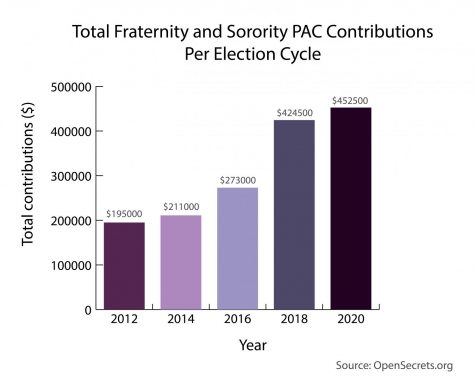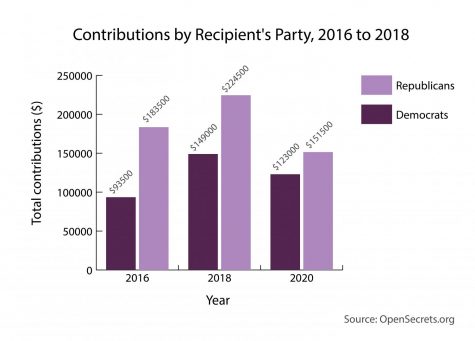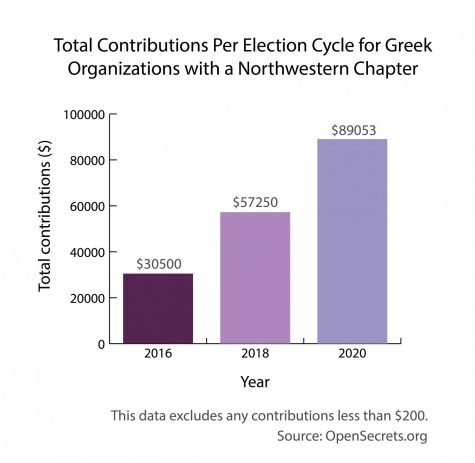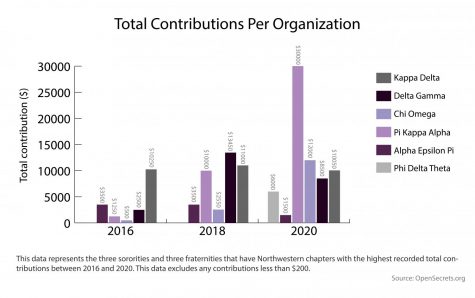“Your dues are political”: NU Greek Life grapples with its financial relationship to FratPAC
Many Greek life members at Northwestern first learned of the Fraternity and Sorority Political Action Committee after seeing a viral Instagram post.
August 6, 2020
“Your dues are political.”
A bright yellow Instagram post with this claim on the first slide rapidly spread throughout the Northwestern Greek community in late July, representing the first time many Northwestern students had heard of the Fraternity and Sorority Political Action Committee.
Known more colloquially as FratPAC, the Fraternity and Sorority PAC collects contributions from Greek organizations and their alumni to lobby congressional members to support Greek interests and to fund election campaigns of Greek life alumni. FratPAC’s actions were detailed in that July 20 post by the Instagram account “Abolish Richmond Greek Life,” which prompted many Northwestern students to reconsider their involvement with Greek life.
A jarring notice of where dues go
Communication junior Camille Garcia-Mendoza, who is in the process of deactivating from Gamma Phi Beta, said she had long been aware of Greek life’s history of exclusion and marginalization, but was shocked at the extent of its political power detailed in the post.
Per the FSPAC’s own data, they typically contribute more to Republicans than Democrats in each election cycle — in 2018, the FSPAC contributed 60 percent to Republicans and 40 percent to Democrats. These numbers mirror the party divide amongst members of Congress with previous Greek affiliation, which the FSPAC reported was 63 percent Republican in 2018. Prominent recipients include U.S. Sen. Kamala Harris (D-Calif.) and Senate Majority Leader Mitch McConnell (R-Ky.).
“To see that they have so much overt political influence through FratPAC was jarring,” Garcia-Mendoza said. “I was really, really upset to think that any of my dues potentially contributed to campaigns that I completely fundamentally disagree with.”
According to data from OpenSecrets.org, the FSPAC has several sources of contributions: national organizations themselves, housing corporations of individual chapters, alumni associations and individual alumni.
Between the 2016 and 2020 election cycles, OpenSecrets.org’s records show that Greek organizations with Northwestern chapters donated over $176,800 nationally to the PAC. However, no Northwestern chapter was recorded donating in that time period.
McCormick junior Anthony Cruz was surprised to see his national organization, Delta Chi, listed as a top donor among Greek organizations on the Instagram post. The post inspired him to look further into what his national organization was doing with the financial dues he paid to his fraternity.
According to articles from the Atlantic and NPR, the national organizations of many fraternities use the dues paid by members to defend themselves against lawsuits, which could be brought for hazing or sexual assault. Cruz said he had previously never known what the money he paid to the national headquarters through dues was used for, and the research “affirmed” his plan to deactivate.
A conflict of interests
Weinberg junior Lauren Masse, president of Northwestern’s chapter of Pi Beta Phi, said in a statement to The Daily that she and leaders of her chapter became concerned after seeing the Instagram post about FratPAC, which listed Pi Phi as the source of the PAC’s largest single donation, among Greek organizations, in 2016.
Many of the PAC’s recipients, Masse wrote, “align with our interests as a Greek organization, but do not align with our core Pi Phi values.” Masse and the chapter’s leadership communicated their concerns to their fraternity headquarters, who informed them that their dues do not directly contribute to the PAC. The national headquarters also defended its contributions as “advantageous because ongoing legislative threats to the fraternity — such as threats to our single-sex status — continue to be of great concern.”
In the past, FratPAC has lobbied to make it harder for universities to investigate campus rape allegations, to make donations for Greek house renovations tax-deductible and to prevent federal anti-hazing legislation from being introduced.
“Our executive council does not think the proposed gains of supporting pro-Greek life legislature outweigh the harms of financially supporting politicians who do not align with our values as an organization,” Masse’s statement read.
So, are your dues political?
The answer varies between organizations and even schools. More consistent is the way FratPAC’s increased visibility is affecting the opinions of current and former Greek life participants.
Garcia-Mendoza said if she had known about FratPAC while going through recruitment, she might have chosen to join a sorority whose national organization did not contribute as heavily. While she had already been planning on deactivating, learning about Gamma Phi’s contributions “increased (her) sense of urgency” to deactivate right away. She said many of her friends in Gamma Phi and other sororities felt the same.
For Cruz, who has since deactivated from Delta Chi, the information changed the way he viewed his time as a member of a fraternity.
“We had this mentality that it was fraternities in general that hurt people and that we were different,” he said. “Looking back, I think we can say with confidence that we aren’t different and that we’re just another fraternity.”
Email: [email protected]
Twitter: @meganmuncie
Related Stories:
— Former and current PHA members report marginalization within NU Greek life
— Anonymous social media posts paint picture of sexual assault in Greek life
— Speak Your Mind: Greek Life and the difficulties of recruitment






